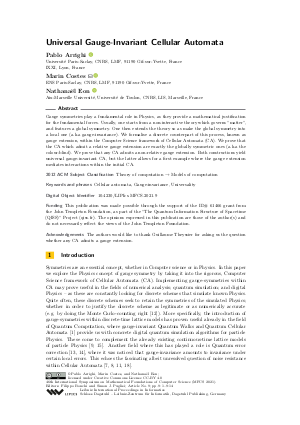Universal Gauge-Invariant Cellular Automata
Authors
Pablo Arrighi  ,
Marin Costes
,
Marin Costes  ,
Nathanaël Eon
,
Nathanaël Eon 
-
Part of:
Volume:
46th International Symposium on Mathematical Foundations of Computer Science (MFCS 2021)
Part of: Series: Leibniz International Proceedings in Informatics (LIPIcs)
Part of: Conference: Mathematical Foundations of Computer Science (MFCS) - License:
 Creative Commons Attribution 4.0 International license
Creative Commons Attribution 4.0 International license
- Publication Date: 2021-08-18
File

PDF
LIPIcs.MFCS.2021.9.pdf
- Filesize: 0.7 MB
- 14 pages
Document Identifiers
Subject Classification
ACM Subject Classification
- Theory of computation → Models of computation
Keywords
- Cellular automata
- Gauge-invariance
- Universality
Metrics
- Access Statistics
-
Total Accesses (updated on a weekly basis)
0Document
0Metadata
Abstract
Gauge symmetries play a fundamental role in Physics, as they provide a mathematical justification for the fundamental forces. Usually, one starts from a non-interactive theory which governs "matter", and features a global symmetry. One then extends the theory so as make the global symmetry into a local one (a.k.a gauge-invariance). We formalise a discrete counterpart of this process, known as gauge extension, within the Computer Science framework of Cellular Automata (CA). We prove that the CA which admit a relative gauge extension are exactly the globally symmetric ones (a.k.a the colour-blind). We prove that any CA admits a non-relative gauge extension. Both constructions yield universal gauge-invariant CA, but the latter allows for a first example where the gauge extension mediates interactions within the initial CA.
Cite As Get BibTex
Pablo Arrighi, Marin Costes, and Nathanaël Eon. Universal Gauge-Invariant Cellular Automata. In 46th International Symposium on Mathematical Foundations of Computer Science (MFCS 2021). Leibniz International Proceedings in Informatics (LIPIcs), Volume 202, pp. 9:1-9:14, Schloss Dagstuhl – Leibniz-Zentrum für Informatik (2021)
https://doi.org/10.4230/LIPIcs.MFCS.2021.9
BibTex
@InProceedings{arrighi_et_al:LIPIcs.MFCS.2021.9,
author = {Arrighi, Pablo and Costes, Marin and Eon, Nathana\"{e}l},
title = {{Universal Gauge-Invariant Cellular Automata}},
booktitle = {46th International Symposium on Mathematical Foundations of Computer Science (MFCS 2021)},
pages = {9:1--9:14},
series = {Leibniz International Proceedings in Informatics (LIPIcs)},
ISBN = {978-3-95977-201-3},
ISSN = {1868-8969},
year = {2021},
volume = {202},
editor = {Bonchi, Filippo and Puglisi, Simon J.},
publisher = {Schloss Dagstuhl -- Leibniz-Zentrum f{\"u}r Informatik},
address = {Dagstuhl, Germany},
URL = {https://drops.dagstuhl.de/entities/document/10.4230/LIPIcs.MFCS.2021.9},
URN = {urn:nbn:de:0030-drops-144490},
doi = {10.4230/LIPIcs.MFCS.2021.9},
annote = {Keywords: Cellular automata, Gauge-invariance, Universality}
}
Author Details
Funding
This publication was made possible through the support of the ID# 61466 grant from the John Templeton Foundation, as part of the “The Quantum Information Structure of Spacetime (QISS)” Project (qiss.fr). The opinions expressed in this publication are those of the author(s) and do not necessarily reflect the views of the John Templeton Foundation.
Acknowledgements
The authors would like to thank Guillaume Theyssier for asking us the question whether any CA admits a gauge extension.
References
- Pablo Arrighi, Cédric Bény, and Terry Farrelly. A quantum cellular automaton for one-dimensional qed. Local proceedings of AQIS 2019. Quantum Information Processing, 19:88, 2020. arXiv preprint. URL: http://arxiv.org/abs/1903.07007.
-
Pablo Arrighi, Giuseppe Di Molfetta, and Nathanaël Eon. A gauge-invariant reversible cellular automaton. In International Workshop on Cellular Automata and Discrete Complex Systems, pages 1-12. Springer, 2018.

-
Pablo Arrighi, Giuseppe Di Molfetta, and Nathanaël Eon. Non-abelian gauge-invariant cellular automata. In International Conference on Theory and Practice of Natural Computing, pages 211-221. Springer, 2019.

- Pablo Arrighi, Giuseppe Di Molfetta, and Nathanaël Eon. Gauge-invariance in cellular automata. arXiv preprint, 2020. URL: http://arxiv.org/abs/2004.03656.
- Pablo Arrighi, Nicolas Durbec, and Aurélien Emmanuel. Reversibility vs local creation/destruction. In Proceedings of RC 2019, LLNCS, volume 11497, pages 51-66. Springer, 2019. URL: https://doi.org/10.1007/978-3-030-21500-2_4.
-
Shailesh Chandrasekharan and U-J Wiese. Quantum link models: A discrete approach to gauge theories. Nuclear Physics B, 492(1-2):455-471, 1997.

-
Péter Gács. Reliable computation with cellular automata. Journal of Computer and System Sciences, 32(1):15-78, 1986.

-
Péter Gács. Reliable cellular automata with self-organization. Journal of Statistical Physics, 103(1):45-267, 2001.

-
IM Georgescu, Sahel Ashhab, and Franco Nori. Quantum simulation. Reviews of Modern Physics, 86(1):153, 2014.

- Pierre Guillon, Pierre-Etienne Meunier, and Guillaume Theyssier. Clandestine Simulations in Cellular Automata. 18 pages, 2010. URL: https://hal.archives-ouvertes.fr/hal-00521624.
-
Masateru Harao and Shoichi Noguchi. Fault tolerant cellular automata. Journal of computer and system sciences, 11(2):171-185, 1975.

-
W Keith Hastings. Monte carlo sampling methods using markov chains and their applications. Biometrika, 57(1):97-109, 1970.

-
A Yu Kitaev. Fault-tolerant quantum computation by anyons. Annals of Physics, 303(1):2-30, 2003.

-
Chetan Nayak, Steven H Simon, Ady Stern, Michael Freedman, and Sankar Das Sarma. Non-abelian anyons and topological quantum computation. Reviews of Modern Physics, 80(3):1083, 2008.

-
Simone Notarnicola, Mario Collura, and Simone Montangero. Real-time-dynamics quantum simulation of (1+ 1)-dimensional lattice qed with rydberg atoms. Physical Review Research, 2(1):013288, 2020.

-
Ville Salo and Ilkka Törmä. Color blind cellular automata. In International Workshop on Cellular Automata and Discrete Complex Systems, pages 139-154. Springer, 2013.

- Pietro Silvi, Enrique Rico, Tommaso Calarco, and Simone Montangero. Lattice gauge tensor networks. New Journal of Physics, 16(10):103015, October 2014. URL: https://doi.org/10.1088/1367-2630/16/10/103015.
-
A. Toom. Cellular automata with errors: Problems for students of probability. Topics in Contemporary Probability and Its Applications, pages 117-157, 1995.

